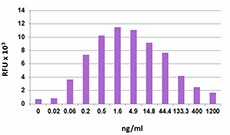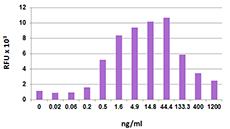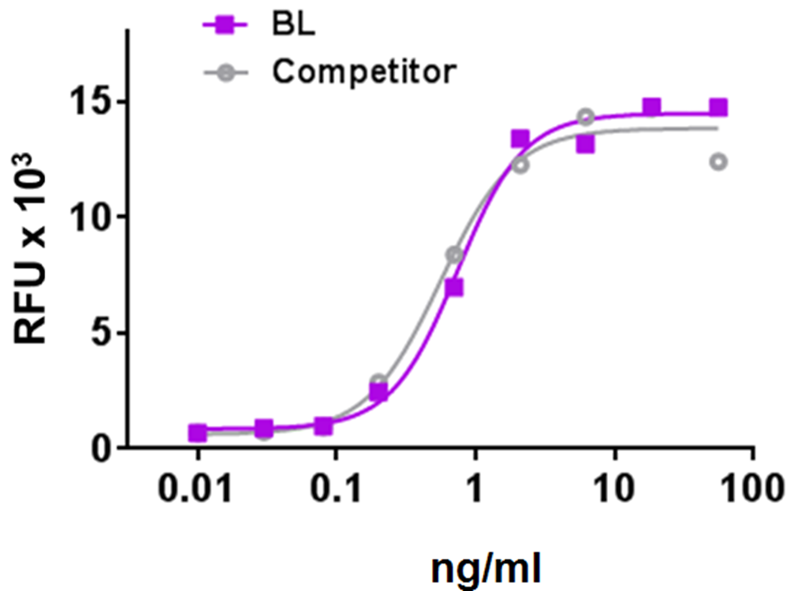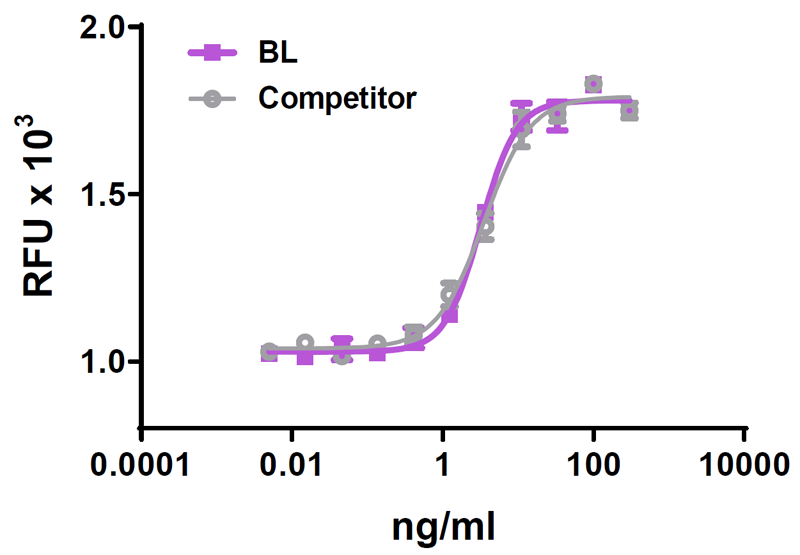- Regulatory Status
- RUO
- Other Names
- EBI1 ligand chemokine, ELC, macrophage inflammatory protein-3-beta
- Ave. Rating
- Submit a Review
- Product Citations
- 2 publications
| Cat # | Size | Price | Save |
|---|---|---|---|
| 582102 | 10 µg | ¥29,260 | |
| 582104 | 25 µg | ¥50,350 | |
| 582106 | 100 µg | ¥136,520 |
CCL19 is a CC chemokine expressed in lymph nodes. CCL19 is only 32% identical to CCL21 at the amino acid level; nevertheless, these chemokines bind to the same receptor, CCR7. CCL19 is not expressed in high endothelial venules (HEV) as CCL21, but CCL19 is transcytosed in HEV. It has been described that CCL19 binds to CCX-CKR and CRAM-B receptors. These two receptors are members of the non-classical chemokine receptor family, which also includes D6, DARC, and CXCR7. It has been suggested that CCX-CKR is a scavenging receptor for CCL19, and CRAM-B receptor might be responsible for the transcytosis in HEV for CCL19. In addition, CRAM recycles constitutively and can internalize CCL19 within a few minutes, suggesting it may play a role in the regulation of immune responses as well as homing processes.
Product DetailsProduct Details
- Source
- Human CCL19, amino acids (Gly22-Ser98) (Accession# NM_006274.2), was expressed in E. coli.
- Molecular Mass
- The 69 amino acid recombinant protein has a predicted molecular mass of approximately 8.8 kD. The DTT-reduced protein migrates at approximately 12kD and non-reduced protein at approximately 13 kD by SDS-PAGE. The N-terminal amino acid is Thr.
- Purity
- >98%, as determined by Coomassie stained SDS-PAGE.
- Formulation
- 0.22 µm filtered protein solution is in PBS.
- Endotoxin Level
- Less than 0.01 ng per µg cytokine as determined by the LAL method.
- Concentration
- 10 and 25 µg sizes are bottled at 200 µg/mL. 100 µg size and larger sizes are lot-specific and bottled at the concentration indicated on the vial. To obtain lot-specific concentration and expiration, please enter the lot number in our Certificate of Analysis online tool.
- Storage & Handling
- Unopened vial can be stored between 2°C and 8°C for up to 2 weeks, at -20°C for up to six months, or at -70°C or colder until the expiration date. For maximum results, quick spin vial prior to opening. The protein can be aliquoted and stored at -20°C or colder. Stock solutions can also be prepared at 50 - 100 µg/mL in appropriate sterile buffer, carrier protein such as 0.2 - 1% BSA or HSA can be added when preparing the stock solution. Aliquots can be stored between 2°C and 8°C for up to one week and stored at -20°C or colder for up to 3 months. Avoid repeated freeze/thaw cycles.
- Activity
- Bioactivity was measured by its property to chemoattract baf3-hCCR7 transfectants in a dose dependent manner.
- Application
-
Bioassay
- Application Notes
-
BioLegend carrier-free recombinant proteins provided in liquid format are shipped on blue-ice. Our comparison testing data indicates that when handled and stored as recommended, the liquid format has equal or better stability and shelf-life compared to commercially available lyophilized proteins after reconstitution. Our liquid proteins are verified in-house to maintain activity after shipping on blue ice and are backed by our 100% satisfaction guarantee. If you have any concerns, contact us at tech@biolegend.com.
- Product Citations
-
Antigen Details
- Structure
- Chemokine.
- Distribution
-
CCL19 is expressed in the T cell zone of lymph nodes, in Peyer's patches by reticular cells, and in spleen by stromal cells. CCL19 is expressed by endothelial cells in lymphatic venules.
- Function
- CCL19 chemoattracts naïve T cells and maturing dendritic cells (DCs) into T zones of secondary lymphoid organs. CCL19 and CCL21 inhibit apoptosis in DCs.
- Interaction
- Thymocytes, activated T cells, naïve CD4 and CD8, mature DCs, antigen-engaged B cells, fibroblast-like synoviocytes of patients with rheumatoid arthritis (RA).
- Ligand/Receptor
- CCR7 (CD197).
- Biology Area
- Cell Biology, Signal Transduction
- Molecular Family
- Cytokines/Chemokines
- Antigen References
-
1. Rossi DL, et al. 1997. J. Immunol. 158:1033.
2. Sánchez-Sánchez N, et al. 2004. Blood 104:619.
3. Comerford I, et al. 2006. Eur. J. Immunol. 36:1904.
4. Leick M, et al. 2009. Immunology 129:536.
5. Le Nouën C, et al. 2011. PLoS Pathog. 7:e1002105. - Gene ID
- 6363 View all products for this Gene ID
- UniProt
- View information about CCL19 on UniProt.org
Related FAQs
- Why choose BioLegend recombinant proteins?
-
• Each lot of product is quality-tested for bioactivity as indicated on the data sheet.
• Greater than 95% Purity or higher, tested on every lot of product.
• 100% Satisfaction Guarantee for quality performance, stability, and consistency.
• Ready-to-use liquid format saves time and reduces challenges associated with reconstitution.
• Bulk and customization available. Contact us.
• Learn more about our Recombinant Proteins. - How does the activity of your recombinant proteins compare to competitors?
-
We quality control each and every lot of recombinant protein. Not only do we check its bioactivity, but we also compare it against other commercially available recombinant proteins. We make sure each recombinant protein’s activity is at least as good as or better than the competition’s. In order to provide you with the best possible product, we ensure that our testing process is rigorous and thorough. If you’re curious and eager to make the switch to BioLegend recombinants, contact your sales representative today!
- What is the specific activity or ED50 of my recombinant protein?
-
The specific activity range of the protein is indicated on the product datasheets. Because the exact activity values on a per unit basis can largely fluctuate depending on a number of factors, including the nature of the assay, cell density, age of cells/passage number, culture media used, and end user technique, the specific activity is best defined as a range and we guarantee the specific activity of all our lots will be within the range indicated on the datasheet. Please note this only applies to recombinants labeled for use in bioassays. ELISA standard recombinant proteins are not recommended for bioassay usage as they are not tested for these applications.
- Have your recombinants been tested for stability?
-
Our testing shows that the recombinant proteins are able to withstand room temperature for a week without losing activity. In addition the recombinant proteins were also found to withstand four cycles of freeze and thaw without losing activity.
- Does specific activity of a recombinant protein vary between lots?
-
Specific activity will vary for each lot and for the type of experiment that is done to validate it, but all passed lots will have activity within the established ED50 range for the product and we guarantee that our products will have lot-to-lot consistency. Please conduct an experiment-specific validation to find the optimal ED50 for your system.
- How do you convert activity as an ED50 in ng/ml to a specific activity in Units/mg?
-
Use formula Specific activity (Units/mg) = 10^6/ ED50 (ng/mL)

















Follow Us